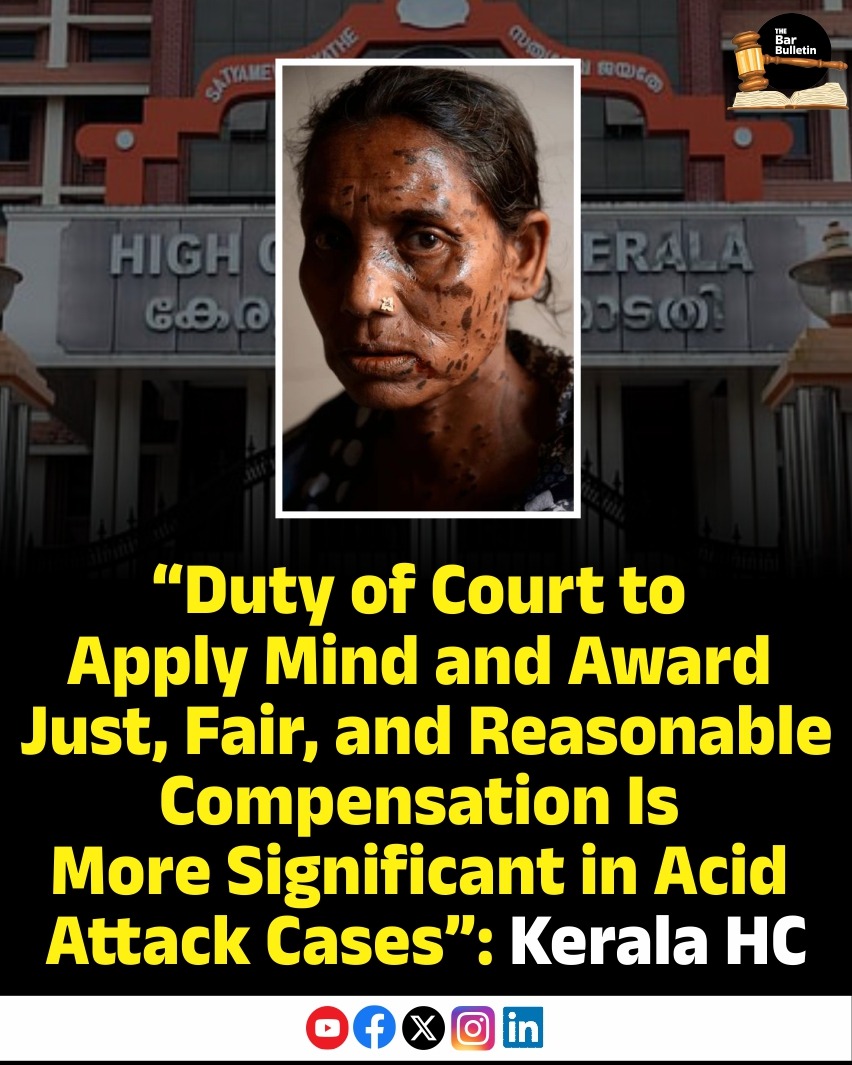In a criminal appeal filed before the Kerala High Court by a man accused of committing offences, including an acid attack on his wife and four children, a Division Bench of Justice Raja Vijayaraghavan V and Justice K.V. Jayakumar partly allowed the appeal and directed the State to pay compensation to the victims as expeditiously as possible.
On 17-01-2019, the complainant was sleeping along with her four minor children in their rented residence when the husband of the complainant (accused) poured acid into the bedroom through the window because of a suspicion that the complainant was having illicit relationships. As a result of the attack, the elder daughter of the couple suffered severe burns on her face and eyes, which resulted in permanent loss of her eyesight. The complainant and the other three children also suffered burn injuries.
The accused faced prosecution for offences punishable under Sections 450[1], 326A[2], and 307[3] of the Indian Penal Code, 1860 (IPC). The Sessions Judge found the accused guilty of offences punishable under Sections 326A and 450 of the IPC, but not of an offence punishable under Section 307, IPC.
The appellant contended that the Sessions Judge had failed to apply the correct legal principles while assessing the evidentiary value of materials placed before it and that none of the victims had seen the person who was behind the acid attack.
The complainant mentioned that she had three children from her first marital relationship, and after her husband died, she fell in love with the appellant and had a daughter with him. Further, she mentioned that she had lodged a complaint against the torturous behaviour of the appellant, after which he was in judicial custody for 35 days. The complainant stated that the Police recorded her statement from the Medical College Hospital, where she was admitted after the acid attack.
The Court evaluated the deposition of PW1, wherein she mentioned that she and her children were subjected to physical and mental torture by the appellant. It was also noted that the complainant mentioned two incidents. One, where the household articles, bed, clothes, etc., were burned by someone, and the other, where she and the children were subjected to an acid attack.
The Court examined the evidence regarding the material circumstances and stated that the complainant and appellant were living separately due to their strained relationship. Guided by the principles laid down in Vinod Kumar v. State (Govt. of NCT of Delhi) 2025 KHC 7124 and Jan Mohammad v. State of Bihar (1953) 1 SCC 5, the Court did not find any reason to disagree with the conclusions of the Session Judge. Further, it was stated that the appellant had a strong motive to cause grievous hurt to his wife and children.
The Court noted that the medical evidence indicated that both the accused and the victim suffered fresh burn injuries from the use of acid. The Court mentioned that it did not find any reason to disagree with the conclusion of the Sessions Judge that the accused had poured acid through the bedroom window.
Further, regarding the offense of house trespass, the Court stated that since the accused, being the lessee, was in possession of the house, there could be no criminal trespass. Hence, the Court set aside the conviction and sentence imposed by the Sessions Judge for the offence under Section 450 of the IPC.
The Court also stated that it was unable to accept the contentions of the appellant that the life imprisonment ordered by the Trial Court was harsh or excessive after considering the facts and circumstances of the case.
It was noted that the Trial Court had not ordered any compensation payable to the victims under Section 357A of the Code of Criminal Procedure, 1973 (CrPC). The Court directed that if the amount of fine is realised, it shall be paid to the victims.
After considering Section 357A, CrPC, and principles laid down by the Supreme Court in Ankush Shivaji Gaikwad v. State of Maharashtra 2013 KHC 4371, Laxmi v. Union of India & Ors. (2014) 4 SCC 427, and Parivartan Kendra v. Union of India & Ors. 2015 KHC 4784, the Court opined that it is the mandatory duty of the criminal court to apply its mind and ensure that just and proper compensation is awarded to the victim of the case.
Further, the Court stated that the Sessions Judge had overlooked the vital aspect of compensation to the victims and found it appropriate to direct the State to pay compensation worth Rs. 3,00,000/- to each victim within two months.
Appearances:
For Appellant – Adv P. Mohamed Sabah, Adv Libin Stanley, Adv R. Gayathri, Adv Sadik Ismayil, Adv Saipooja, Adv M. Mahin Hamza, Adv Safiya Akbar, SPL PP Ambika Devi
For Respondent/Complainant – Adv Bindu O.V.
[1] Section 332(b) of the Bharatiya Nyaya Sanhita, 2023
[2] Section 124 of the Bharatiya Nyaya Sanhita, 2023
[3] Section 109 of the Bharatiya Nyaya Sanhita, 2023

